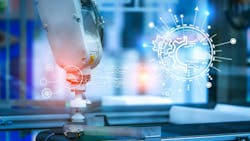Early Adopters and AI: What Are the Best Use Cases?
Machinery companies are betting artificial intelligence (AI) can help address pressing challenges, from supply chain volatility to the shortage of skilled workers. Three-quarters of advanced manufacturing executives say that adopting emerging technologies such as AI is their top priority in engineering and R&D, according to Bain research.
Investment in the AI market in industrial machinery, which includes intelligent hardware, software and services, is forecast to reach $5.46 billion in 2028, according to the Business Research Company.
Artificial intelligence is a broad term that encompasses technologies such as basic data analytics, machine learning (ML), deep learning, and generative AI. Leading companies start by identifying their top business challenges and then selecting the AI solutions best suited to use data to create value.
Generative AI in manufacturing is in its infancy, but many believe it will transform the sector. Specifically, the large language models that underpin generative AI fundamentally change how people interact with systems and documents. Generative AI can surface hidden insights from unstructured data that can lead to dramatic improvements in productivity, customer service, and financial performance.
Early adopters are using AI to solve key problems in procurement, assembly, maintenance, quality control, and warehouse logistics. Some are deploying generative AI to synthesize huge volumes of unstructured data. Others are experimenting with generative AI service bots that partner with field technicians, for instance, to recognize more quickly when maintenance is required and to improve the quality of that work. Those who are pulling ahead are also integrating AI solutions into processes and back-end systems.
A Lack of Understanding
More than 90% of machinery companies already collect and store production data, according to a recent Bain survey. But most do not know how to derive value from it. One reason is a lack of understanding about where AI can deliver the greatest returns.
Early adopters are already using AI to improve supply chain management and resilience and to identify failures before they occur in industrial assets, equipment, and infrastructure. For example, AI can report supply chain bottlenecks in real time and predict potential disruptions in advance.
Other critical uses for AI in manufacturing include minimizing assembly defects and improving quality control; boosting productivity; and streamlining warehouse management.
Improve quality: AI can help identify mistakes in real time to improve assembly efficiency and product quality. For example, one machinery original equipment manufacturer (OEM) adopted AI-based video processing to track manual assembly activities, automate quality checks of manual assembly activities, and help optimize the use of resources and employees. Those solutions helped the machinery OEM reduce failures in the assembly process by as much as 70% while also cutting down efforts for quality checks by 50% for some lines.
In another case, a material supplier for machinery OEMs used computer vision to detect foreign objects in chemical bulk material instead of relying only on human inspections. The accuracy of the automated inspection increased by 80%, to greater than 99%, compared with today’s mainly manual visual inspection.
Boost productivity: AI can also boost employee productivity, helping companies squeezed by worker shortages. One machinery manufacturer adopted an AI-powered industrial copilot that converts natural language into code and translates old programming languages into natural language, completing both tasks faster and better than human developers. Among other benefits, engineers using this AI solution were approximately 5% more productive, according to preliminary results. Machine downtime also declined since the company had fewer data deployment errors and it addressed problems faster.
Streamline warehouse management: AI can also help ensure that warehouses operate at top efficiency, carrying items that meet demand and minimizing extra inventory. One equipment machinery company adopted an AI-based inventory management system that helped it minimize overstock while still fulfilling all orders.
AI also provides more flexible job production planning so that companies can allocate specific assembly activities to the most relevant assembly expert at a given time to maximize productivity. As a result, the manufacturer can simultaneously enhance the quality of its products and adjust processes to meet specific customer needs. In short, AI allows companies to customize and personalize without negatively affecting planning, productivity, and costs on the shop floor.
Test-and-Learn Approach
Top-performing companies monitor their return on investment throughout the AI implementation and ensure that they factor in all costs. While this may seem obvious, many companies forget to log computation costs on the cloud, for instance. Leaders also reassess their AI investment decisions on a quarterly basis.
To keep pace with rapid changes in AI, leaders use modular and loosely coupled components, connected via microservices, to make it easy to replace software. Successful companies also verify that efficient processes and tools (MLOps/DevOps) are factored into the technical architecture so that they can deploy AI at scale.
Leaders in AI embrace a test-and-learn approach. Machinery engineers typically favor rigorous thinking and perfect product design. Software and AI work, however, require a test-and-learn, fail-fast approach. In successful AI implementations, plant engineers and AI experts collaborate closely to create, test, and refine AI models to meet the company’s goals.
AI has captured the imagination of machinery executives. As a growing number of companies experiment with and deploy new solutions, they are raising the industry bar for productivity and performance. Companies that defer investing will need to run twice as fast to keep pace.
About the Author
Prashanth Parthasarathy
Expert Associate Partner, Bain & Co.
Prashanth Parthasarathy is an expert associate partner in Bain’s Advanced Manufacturing and Services practice and is based in the firm’s London office.
Guido Vetter
Expert Partner, Bain & Co.
Guido Vetter is an expert partner in Bain’s Advanced Analytics practice and its Advanced Manufacturing and Services practice. He is based in the company’s Frankfurt office.
